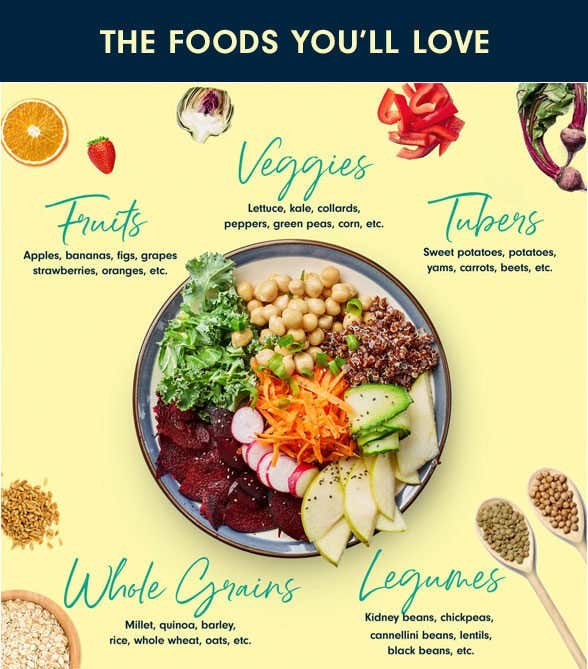All About Healthy Food: Advantages of Embracing Plant Based Alternatives
The discussion bordering plant-based diet regimens has gotten substantial focus in recent times. Numerous individuals are checking out the potential health benefits, nutritional benefits, and ecological effects linked with these dietary selections. As people come to be extra knowledgeable about their food's impact on health and sustainability, inquiries occur about the practicalities of embracing such a way of living. What particular changes can one expect, and how might these selections reshape not only personal wellness but also the earth's future?
Understanding Plant-Based Diet Plans
Several people associate plant-based diets primarily with vegetarianism or veganism, these diets can incorporate a large variety of consuming patterns that prioritize entire, minimally processed plant foods. Such diet regimens usually consist of fruits, veggies, entire grains, nuts, seeds, and beans, while getting rid of or limiting pet items. This adaptability allows people to customize their dietary options according to individual preferences and dietary needs. Some might take on a largely plant-based diet while still periodically consuming meat or dairy products, typically referred to as a flexitarian technique. The emphasis continues to be on including even more plant foods, which can lead to a diverse variety of tastes and dishes. Recognizing these different analyses of plant-based eating is essential for appreciating its availability and charm in modern food society.
Health Conveniences of Plant-Based Foods
The health benefits of plant-based foods are substantial, supplying a nutrient density benefit that sustains general health. Study indicates that these foods can improve heart wellness and play a necessary function in reliable weight management. By integrating much more plant-based choices, individuals might improve their nutritional options and advertise long-term health.
Nutrient Density Advantage
Nutrient thickness plays an important function in the health and wellness benefits of plant-based foods, making them an engaging option for those seeking a well balanced diet plan. Plant-based foods, such as fruits, vegetables, vegetables, nuts, and whole grains, are frequently abundant in crucial vitamins, minerals, and anti-oxidants while being reduced in calories. This high nutrient density allows people to eat less calories while still fulfilling their dietary needs. In addition, these foods are packed with nutritional fiber, advertising gastrointestinal wellness and aiding in weight administration. By including nutrient-dense plant-based options, consumers can boost their total health and wellness, sustain their body immune systems, and reduce the threat of persistent diseases. Inevitably, the nutrient density of plant-based foods underscores their value in a health-conscious lifestyle.
Heart Health And Wellness Enhancement

Weight Monitoring Assistance
Along with promoting heart health, a plant-based diet regimen can substantially help in weight monitoring. This dietary strategy emphasizes entire foods such as fruits, veggies, beans, nuts, and whole grains, which are normally reduced in calories and greater in fiber compared to animal-based products. The high fiber material assists enhance satiety, decreasing total calorie intake. In addition, plant-based diet regimens are commonly rich in essential nutrients while low in harmful fats, making it much easier to keep a healthy weight. Sugar Free Sauces. Study suggests that people who embrace a plant-based way of life have a tendency to have reduced body mass indexes (BMIs) and experience even more effective weight reduction contrasted to those that consume meat-heavy diet plans. Consequently, welcoming plant-based options is a calculated selection for efficient weight administration
Nutritional Value of Plant-Based Ingredients
Plant-based active ingredients are abundant in crucial nutrients, supplying a varied variety of vitamins, minerals, and antioxidants that add to general health and wellness. A comparison of protein sources exposes that while pet items are commonly considered as remarkable, many plant-based options offer sufficient protein and various other useful compounds. Understanding the dietary value of these components can aid people make notified dietary choices.
Crucial Nutrients in Plants
Nutrient-rich active ingredients found in plants use a diverse range of necessary vitamins and minerals that add considerably to overall wellness. These active ingredients are abundant in vitamins A, C, and K, which sustain immune function, vision, and blood clot, specifically. Additionally, plants provide vital minerals such as potassium, calcium, and magnesium, critical for heart health, muscular tissue feature, and bone stamina. The Learn More presence of fiber in plant-based foods aids food digestion and promotes a healthy and balanced digestive tract microbiome. Antioxidants, discovered generously in vegetables and fruits, help combat oxidative anxiety and decrease inflammation. Furthermore, lots of plant foods are reduced in calories yet high in nutrients, making them an exceptional choice for those looking for to keep a healthy weight while making sure optimal nutrient consumption.
Comparing Healthy Protein Resources
Protein resources differ significantly in their dietary profiles, with plant-based components providing distinct benefits. Unlike animal proteins, which commonly include hydrogenated fats and cholesterol, plant proteins often tend to be lower in these harmful components. Legumes, nuts, seeds, and entire grains are abundant in necessary amino acids, fiber, vitamins, and minerals. As an example, lentils provide high healthy protein material pop over to this web-site together with considerable iron and folate, while quinoa is a total healthy protein, supplying all nine vital amino acids. Furthermore, plant-based proteins are usually accompanied by anti-oxidants and phytochemicals that sustain total wellness. The shift to plant-based healthy protein sources not only boosts dietary consumption yet likewise straightens with sustainable dietary practices, decreasing ecological effect and promoting long-term health and wellness benefits.
Ecological Influence of Plant-Based Eating
As understanding of climate change expands, lots of people are discovering sustainable dietary options that can substantially minimize their ecological footprint. Plant-based consuming has actually emerged as a significant contributor to minimizing greenhouse gas discharges, which are mostly connected with livestock production. The cultivation of fruits, veggies, grains, and vegetables usually needs less resources, such as water and land, contrasted to animal farming. In addition, plant-based diet plans can bring about reduced logging, as less land is needed for grazing livestock or expanding animal feed. By moving towards plant-based alternatives, consumers can sustain biodiversity and promote healthier environments. Generally, accepting plant-based eating not only benefits individual wellness however likewise stands for an important action towards ecological sustainability and conservation initiatives.
Conquering Common Misconceptions
While many people acknowledge the advantages of a plant-based diet plan, numerous misunderstandings often prevent them from fully welcoming this way of living. An usual idea is that plant-based diet regimens lack adequate healthy protein; however, countless plant resources, such as beans, nuts, and tofu, give sufficient protein. Furthermore, some assume that this diet is pricey, when actually, staples like beans, rice, and seasonal vegetables can be rather budget friendly. Another mistaken belief is that plant-based eating is overly limiting, whereas it in fact supplies a varied variety of foods and flavors. Several fret that a plant-based diet plan may lead to deficiencies, yet with proper preparation, individuals can obtain all required nutrients, including vitamins and minerals, while delighting in a broad variety of scrumptious meals.
Tips for Transitioning to a Plant-Based Lifestyle
Making the shift to a plant-based way of life can be an enriching experience, though it typically needs some support to browse the preliminary adjustments. People are encouraged to start progressively, incorporating more fruits, veggies, vegetables, and whole grains right into their dishes while reducing meat and dairy products intake. Meal preparation is crucial; preparing a weekly menu can help alleviate the modification and avoid final unhealthy selections. Discovering brand-new recipes and cooking methods can likewise improve the experience and keep enjoyment concerning plant-based eating. Additionally, signing up with assistance groups or communities can provide motivation and share useful tips. Finally, remaining notified regarding nourishment warranties balanced meals, preventing deficiencies while promoting a healthy and balanced, rewarding plant-based way of living.
Delicious Plant-Based Meal Ideas
Exploring delicious plant-based dish ideas can motivate individuals to welcome an extra nutritious diet plan. One popular choice is a passionate quinoa salad, featuring cherry tomatoes, cucumber, and a tangy lemon-tahini dressing. One more favorite is a tasty lentil stew, loaded with carrots, celery, and fragrant herbs, best for a comforting supper. For morning meal, over night oats made with almond milk, chia seeds, and topped with fresh berries provide a nutritious start to the day. Additionally, a vivid vegetable stir-fry with tofu and a range of vibrant veggies can be a official website quick yet pleasing meal. Luscious avocado toast on whole-grain bread, sprayed with seasonings and seeds, provides an easy yet savory snack. These meals display the variety and richness of plant-based consuming.

Often Asked Inquiries
Can a Plant-Based Diet Plan Offer Enough Protein?
The concern of whether a plant-based diet plan can give sufficient protein prevails. Many sources, including beans, nuts, seeds, and entire grains, can satisfy protein requires efficiently, supporting a healthy and balanced diet for people.
Are Plant-Based Diet Regimens Suitable for Children?
The suitability of plant-based diet regimens for kids relies on careful planning. Appropriate nutrients must be ensured, including vitamins, healthy proteins, and minerals. With correct assistance, such diet plans can sustain healthy growth and growth in youngsters.
How Do I Eat in restaurants on a Plant-Based Diet?
Eating in restaurants on a plant-based diet includes seeking dining establishments with diverse menus, requesting for modifications, and exploring vegan-friendly options. Preparation ahead and connecting nutritional choices can boost the eating experience while preserving dietary options.
What Prevail Allergens in Plant-Based Foods?
Typical irritants in plant-based foods consist of soy, gluten, nuts, and seeds - Plant Based Chicken. People complying with a plant-based diet regimen needs to be aware of these allergens and review tags thoroughly to stay clear of adverse responses and assure risk-free usage
Can Plant-Based Diets Assist With Weight Loss?
Research study indicates that adopting a plant-based diet may assist in weight-loss as a result of its usually reduced calorie thickness and greater fiber material. This mix can improve satiation, aiding people handle their calorie consumption effectively. Numerous people associate plant-based diets generally with vegetarianism or veganism, these diet plans can encompass a wide range of consuming patterns that focus on entire, minimally refined plant foods. Nutrient thickness plays a crucial function in the health benefits of plant-based foods, making them an engaging selection for those looking for a balanced diet. Plant-based diet regimens have been shown to noticeably improve heart health, as they often include elements that support cardiovascular function. In addition to promoting heart health, a plant-based diet can substantially assist in weight monitoring. An usual belief is that plant-based diet regimens lack adequate protein; nevertheless, many plant resources, such as legumes, nuts, and tofu, give adequate protein.